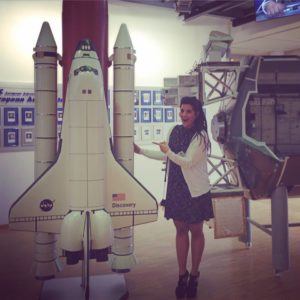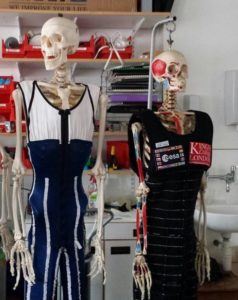Profile
Julia Attias
Curriculum Vitae
-
Education:
I attended King Solomon High School in Ilford Essex from 1997-2004, follwed by Canterbury Christ Church University for my bachelors degree 2004-2007, King’s College London for my Masters degree in 2011-2012, and am still at King’s College London for my PhD
-
Qualifications:
I have 11 GCSE’s with A’s in Maths and PE; 3 A-Levels in Geography, Physical Education and Psychology, a BSc in Sport and Exercise Science with Psychology, and A Masters in Space Physiology and Health
-
Work History:
I worked for Nuffield Health for 7 years from 2007-2014 and had a number of roles including fitness instructing, personal training, health mentoring and as a physiologist. I have also worked in retail establishments through university. I have and still work in many clinical locations as a cardiac physiologist, and with a tutoring company for one-to-one science tutoring. Finally I work for an online fitness company as a writer.
-
Current Job:
I am a PhD student in Space Physiology, researching into countermeasures that can help to protect astronauts in space. I still also work as a cardiac physiologst and as a fitness writer and I voluntarily spend time working with the UK Space Environments Association.
-
Employer:
King’s College London
-
My work
I’m a PhD student at King’s College London researching into ways that will help to protect astronauts bodies in space
-
Read more
I research with a Skinsuit that has been designed to recreate gravity in order to help protect the health of astronauts when they go in to space. The Skinsuit may maintain the integrity of many physiological systems and processes, and it is my job to attempt an understanding of this. I am particularly interested in how the skinsuit interacts with exercise, and any changes it may incur to our energy expenditure or muscle activity. It’s also important that we understand this, in the hopeful eventuality that the skinsuit is integrated with future space missions! It has already been sent to the International Space Station once in September 2015, and we hope for many more.
-
My Typical Day
Breakfast, check emails, run my study in the lab, lunch, analyse data from the study I am doing (and make pretty graphs), go to the gym, read journal articles, go home, dinner, check emails again, socialise/relax, sleep!
-
Read more
It’s hard to summarise my day to day job in one sentence as it changes all the time – which is the great thing about being a scientist! If I am running a study – which could involve asking people to exercise on a bicycle in the skinsuit – then most of my time is spent in the laboratory running the study and collecting data. Once I finish a study, most of my time is spent analysing the data that I have collected, and making sense of the numbers and creating lots of pretty graphs (or trying to anyway!). Then I think about planning the next study, which is mainly knocking heads with my supervisors and reading literature to come up with ideas of what my next study should entail, followed by lots of documentation for the ethics committee to make sure that they know that no one is going to get hurt with what I plan to do! Then there are the other random tasks, which include helping undergraduate students with their practical sessions, giving presentations both at university to my colleagues and at conferences about my work, attending seminars to constantly improve my knowledge, attend meetings with my supervisors about my progress, arrange meetings with other academics/professionals who might help me with a query/expand ideas for my research. I also spare some of my time for media engagement like articles for the BBC and TV filming for the discovery channel, and public outreach activities like this!
-
What I'd do with the prize money
To set up a YouTube channel to promote female scientists and inspire other women to work within the STEM subjects
-
Read more
I have wanted to set up a YouTube channel for a while. I want to help inspire other women to enter the field of science. I have to work every day to fight and break down stereotypes that I have been faced with for my entire life to date. I find things every day that make me stop and think: Why do I still walk into a conference room full of men and very few women? Why do I only ever see men on the train tracks on the London Underground working to fix the tracks? Why I have a still never met a female pilot (which is even more surprising considering the field I work in)? If a man can do it, a woman can do it! I frequently give talks in schools about my journey, and how I got to where I am today, because it is still rare to be a female working within the space science domain (and even science in general). It’s a double edged sword; I like that it is rare, because it makes me different, and I like being different. But I also hate that it is like this, because we as women should be doing the same things as men. So like the talks I give in schools, I would like to reach out to the wider public, and hopefully help to inspire them too with a YouTube channel, where I plan to post general science tutorials, Space physiology related topics and experiments, and some personal insights and experiences too.
-
My Interview
-
How would you describe yourself in 3 words?
Curious, ambitious and personable
What was your favourite subject at school?
P.E – especially at A-Level when we first started learning about physiology. I absolutely loved learning about our body and how it worked
What did you want to be after you left school?
A TV Presenter – I originally signed up for a joint degree with Film studies as one half and Sport science as the other. Turns out the university realised a month before I was supposed to start that the combination of the two no longer existed and I had to choose one or the other. I chose Sports Science, and very happy I did otherwise I wouldn’t be doing what I am doing today. Funnily enough I have been involved in (and really enjoy) some media ventures communicating aspects of science and my work, so it all ends up linking after all.
Were you ever in trouble at school?
Rarely – only for chatting with my friends too much
What is the most fun thing you've done?
It’s got to be when I flew on a Parabolic Flight (a zero-gravty flight, also known as the vomit comet) In March 2014 with ESA astronaut Thomas Pesquet. I’ve spent approximately 10 minutes (in total) in real weightlessness like an astronaut!
-
-
Work photos:
A news article for the BBC on the MK III Skinsuit
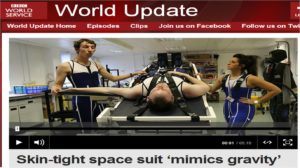
Doing some filming for the Discovery Channel with the Mk VI Skinsuit – to be aired in March 2016
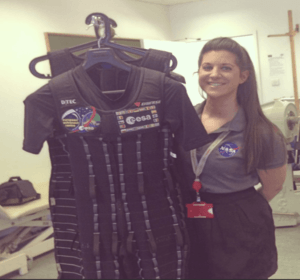
Me presenting my work at the International Congress of Aviation and Space Medicine, September 2015
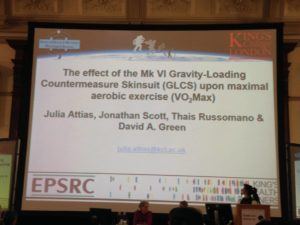
I may be the researcher but I’ll also always be the participant too! Me participating in my own study of cycling with the Mk III skinsuit
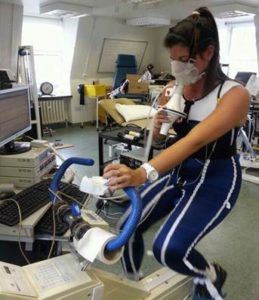
Me floating around in weightlessness on the Parabolic Flight in Bordeaux, 2014 😀
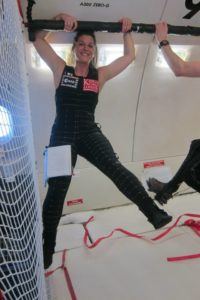
The Skinsuit being worn on the International Space Station by ESA astronaut Andreas Mogensen, which without the work of myself and my colleagues wouldn’t have been possible
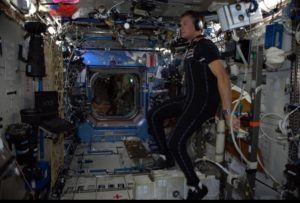
We work hard but we also play from time to time 🙂 Myself and my Skinsuit colleagues in front of our Zero-G ride
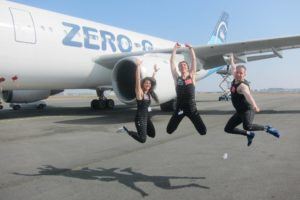
Just another day at the office… Filming at the European Astronaut Centre for a new TV science series for the Discovery Channel – watch this space!
